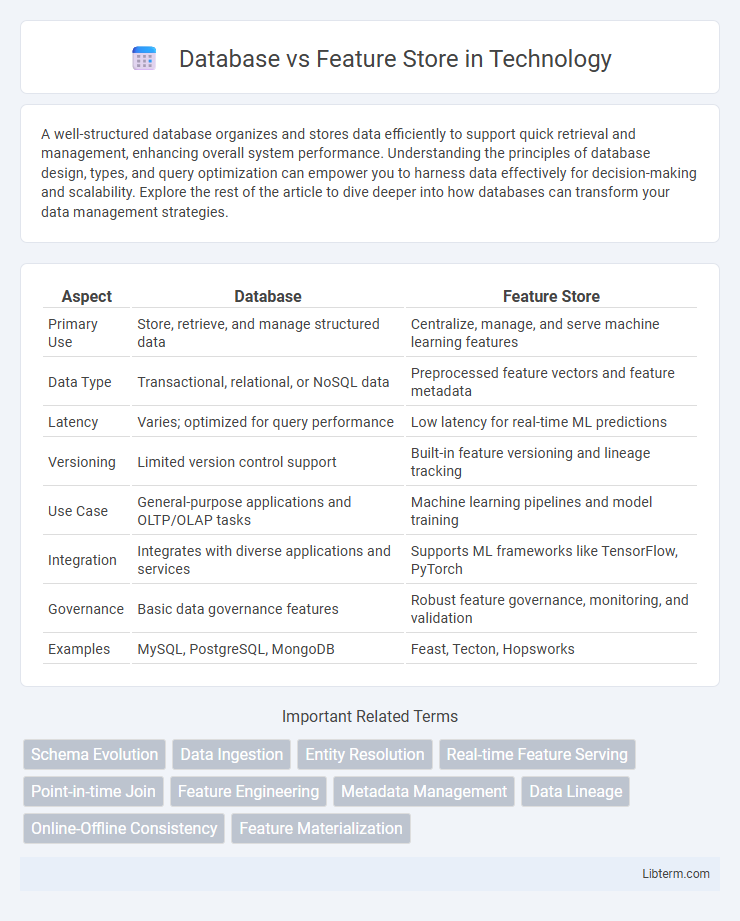A well-structured database organizes and stores data efficiently to support quick retrieval and management, enhancing overall system performance. Understanding the principles of database design, types, and query optimization can empower you to harness data effectively for decision-making and scalability. Explore the rest of the article to dive deeper into how databases can transform your data management strategies.
Table of Comparison
| Aspect | Database | Feature Store |
|---|---|---|
| Primary Use | Store, retrieve, and manage structured data | Centralize, manage, and serve machine learning features |
| Data Type | Transactional, relational, or NoSQL data | Preprocessed feature vectors and feature metadata |
| Latency | Varies; optimized for query performance | Low latency for real-time ML predictions |
| Versioning | Limited version control support | Built-in feature versioning and lineage tracking |
| Use Case | General-purpose applications and OLTP/OLAP tasks | Machine learning pipelines and model training |
| Integration | Integrates with diverse applications and services | Supports ML frameworks like TensorFlow, PyTorch |
| Governance | Basic data governance features | Robust feature governance, monitoring, and validation |
| Examples | MySQL, PostgreSQL, MongoDB | Feast, Tecton, Hopsworks |
Introduction to Databases and Feature Stores
Databases are structured systems designed to efficiently store, retrieve, and manage large volumes of data, supporting various applications through organized tables, indexes, and query languages like SQL. Feature stores specialize in managing and serving machine learning features, ensuring consistency, versioning, and low-latency access for model training and inference workflows. While databases handle general-purpose data management, feature stores are optimized for the unique requirements of ML pipelines, integrating data from multiple sources and maintaining feature lineage and governance.
Core Concepts: What is a Database?
A database is a structured collection of data organized for efficient storage, retrieval, and management, supporting operations like querying, updating, and indexing. It stores diverse data types in tables, documents, or key-value pairs, optimized for consistency, durability, and transaction processing. Core concepts include schemas, normalization, and ACID properties that ensure data integrity and reliability across applications.
Core Concepts: What is a Feature Store?
A feature store is a centralized platform designed for managing, storing, and serving machine learning features to ensure consistency between training and serving environments. Unlike traditional databases that store raw data, feature stores focus on feature engineering, transformation, and real-time feature retrieval optimized for ML workflows. They provide versioning, lineage tracking, and efficient feature sharing across teams, enabling scalable and reproducible machine learning model development.
Key Differences Between Databases and Feature Stores
Databases primarily store raw data optimized for transactional speed and query flexibility, while feature stores specialize in managing and serving machine learning features efficiently for model training and online inference. Feature stores integrate feature transformation, versioning, and consistency across training and production environments, which databases typically do not provide natively. The distinct architecture of feature stores supports feature reuse and real-time feature retrieval, enabling scalable and reliable ML workflows compared to conventional databases.
Data Storage and Schema Management
Databases store structured and unstructured data using predefined schemas or flexible models, supporting a wide variety of query operations and transactional consistency. Feature stores specialize in managing feature data by enforcing strict schemas tailored for machine learning workflows, enabling efficient feature retrieval and reproducibility. While databases emphasize general-purpose data storage and schema flexibility, feature stores prioritize optimized storage and schema management for consistent, versioned feature access across ML pipelines.
Data Processing and Transformation Capabilities
Feature stores provide specialized data processing and transformation capabilities tailored for machine learning workflows, enabling efficient feature engineering, validation, and versioning. Databases primarily focus on raw data storage and retrieval while offering limited built-in support for complex feature transformations or real-time feature computation. Feature stores integrate seamlessly with data pipelines to automate feature extraction and ensure feature consistency across training and serving environments.
Real-Time vs Batch Data Serving
Databases primarily support batch data serving by efficiently handling large volumes of stored information with structured queries, optimized for consistency and durability. Feature stores enable real-time data serving by providing low-latency access to machine learning features, ensuring up-to-date inputs for predictive models during inference. While databases excel in transactional and historical data management, feature stores bridge the gap by delivering fresh, feature-engineered data necessary for real-time AI applications.
Integration with Machine Learning Workflows
Databases provide reliable storage and querying capabilities for structured data but lack specialized support for versioning, feature transformations, and metadata management critical in machine learning workflows. Feature stores streamline integration by offering centralized repositories that track feature lineage, ensure consistency between training and serving environments, and support real-time feature retrieval. This enables seamless collaboration between data engineers and ML practitioners, accelerating model development and deployment.
Use Cases: When to Use a Database vs a Feature Store
Databases are ideal for transactional systems, real-time queries, and storing raw application data, supporting use cases such as web applications, customer relationship management, and financial records. Feature stores excel in machine learning pipelines by centralizing, versioning, and serving engineered features for training and online inference, enhancing model consistency, and reducing feature engineering duplication across teams. Choose a database for general-purpose data storage and a feature store when managing features specifically for scalable, reproducible, and production-ready ML workflows.
Choosing the Right Solution for Your Data Needs
Selecting between a database and a feature store depends on your data management and machine learning operational requirements. Databases excel at storing structured data for transactional and analytical use, while feature stores provide specialized capabilities for managing, serving, and reusing machine learning features with consistency and scalability. For teams focused on accelerating model development and deployment, a feature store ensures efficient feature engineering, version control, and real-time data access, whereas traditional databases suit general-purpose data storage and query workloads.
Database Infographic

 libterm.com
libterm.com